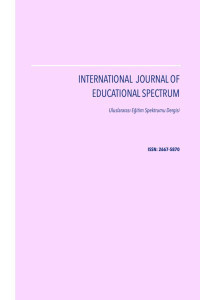Abstract
In recent years, there has been a significant increase in the awareness of communication and interaction among the vast majority of people from all over the world. The increase in this awareness has also caused a change in the understanding of management and leadership. Since ancient philosophers, 'leadership' has been regarded as one of the most important, perhaps even the most important, factor affecting the success or failure of an organization. For this reason, understanding the executive leadership styles will have the potential to contribute to business life in general, as well as providing new intuitions to researchers interested in management science.
Leaders are people who can increase the organizational commitment of employees with their characteristics, management and direction skills and methods. In order for today's organizations to be successful and to continue their existence, the necessity of adopting contemporary leadership approaches as well as classical leadership approaches has emerged. In this direction, the aim of this study is to introduce the leadership styles by scanning the literature and to contribute to the specific areas of knowledge that are missing. This study presents leadership and its definitions, historical review of leadership, leadership theory, leadership styles and general theoretical framework.
References
- Atkin-Plunk, C. A., Armstrong, G. S. (2013). ‘Transformational leadership skills and correlates of Prison Warden job stress’. Criminal Justice and Behavior. 40, 551.
- Aycan, Z., Fikret-Paşa, S., (2003). ‘Career choices, job selection criteria, and leadership preferences in a transitional nation: The case of Turkey’. Journal of Career Development. 30, (2).
- Brown, M. E., Treviño, L. K., Harrison, D. A. (2005). ‘Ethical leadership: A social learning perspective for construct development and testing’. Organizational Behavior and Human Decision Processes. 97, 117–134.
- Çağlar, E. S., (2011). The impact of empowerment on work engagement mediated through psychological empowerment: Moderating roles of leadership styles and work goals. Published Doctoral Thesis. Marmara University, Institute of Social Sciences, Department of Business Administration in English, Department of Organizational Behavior, Istanbul.
- Çalışkan, S. C. (2009). Toward a linkage between leadership competencies, paternalistic leadership styles and cultural assumptions on leader-member exchange perceptions of managers. Yayınlanmış Doktora Tezi. Marmara Üniversitesi, Sosyal Bilimler Enstitüsü, İngilizce İşletme Anabilim Dalı, Örgütsel Davranış Bilim Dalı, İstanbul.
- Çetin, C., ve Mutlu, E. C. (2010). Temel İşletmeciliğe Giriş, Beta Yayınevi, 4.
- Koçel, T. (2001). İşletme Yöneticiliği, Yönetim Organizasyon, Organizasyonlarda Davranış, Klasik-Modern-Çağdaş ve Güncel Yaklaşımlar, Beta Basın Yayım Dağıtım A.Ş. Cağaloğlu, İstanbul.
- Liden, R. C., Wayne, S. J., Zhao, H., Henderson, D. (2008). ‘Servant leadership: Development of a multidimensional measure and multi-level assessment. The Leadership Quarterly. 19,161– 177.
- Robbins, S.P. (2003), Organizational Behavior, Concepts, Controversies, Applications, Prentice Hall International Inc., New Jersey.
- Tengilimoğlu, D.(2005). A Field Study on the Determination of Leadership Behavior Characteristics in Public and Private Sector Organizations, Electronic Journal of Social Sciences, 4,S.14, s. 1-16.
- Tunçay, E. (2013). The role of leadership style in the relationship between organizational climate and burnout. Ataturk University Journal of Economics and Administrative Sciences, 24 (4), 113-135
- Yukl, G. (2008). Leadership in organizations (5.basım) Upper Saddle River, NJ: Prentice Hall.
Abstract
References
- Atkin-Plunk, C. A., Armstrong, G. S. (2013). ‘Transformational leadership skills and correlates of Prison Warden job stress’. Criminal Justice and Behavior. 40, 551.
- Aycan, Z., Fikret-Paşa, S., (2003). ‘Career choices, job selection criteria, and leadership preferences in a transitional nation: The case of Turkey’. Journal of Career Development. 30, (2).
- Brown, M. E., Treviño, L. K., Harrison, D. A. (2005). ‘Ethical leadership: A social learning perspective for construct development and testing’. Organizational Behavior and Human Decision Processes. 97, 117–134.
- Çağlar, E. S., (2011). The impact of empowerment on work engagement mediated through psychological empowerment: Moderating roles of leadership styles and work goals. Published Doctoral Thesis. Marmara University, Institute of Social Sciences, Department of Business Administration in English, Department of Organizational Behavior, Istanbul.
- Çalışkan, S. C. (2009). Toward a linkage between leadership competencies, paternalistic leadership styles and cultural assumptions on leader-member exchange perceptions of managers. Yayınlanmış Doktora Tezi. Marmara Üniversitesi, Sosyal Bilimler Enstitüsü, İngilizce İşletme Anabilim Dalı, Örgütsel Davranış Bilim Dalı, İstanbul.
- Çetin, C., ve Mutlu, E. C. (2010). Temel İşletmeciliğe Giriş, Beta Yayınevi, 4.
- Koçel, T. (2001). İşletme Yöneticiliği, Yönetim Organizasyon, Organizasyonlarda Davranış, Klasik-Modern-Çağdaş ve Güncel Yaklaşımlar, Beta Basın Yayım Dağıtım A.Ş. Cağaloğlu, İstanbul.
- Liden, R. C., Wayne, S. J., Zhao, H., Henderson, D. (2008). ‘Servant leadership: Development of a multidimensional measure and multi-level assessment. The Leadership Quarterly. 19,161– 177.
- Robbins, S.P. (2003), Organizational Behavior, Concepts, Controversies, Applications, Prentice Hall International Inc., New Jersey.
- Tengilimoğlu, D.(2005). A Field Study on the Determination of Leadership Behavior Characteristics in Public and Private Sector Organizations, Electronic Journal of Social Sciences, 4,S.14, s. 1-16.
- Tunçay, E. (2013). The role of leadership style in the relationship between organizational climate and burnout. Ataturk University Journal of Economics and Administrative Sciences, 24 (4), 113-135
- Yukl, G. (2008). Leadership in organizations (5.basım) Upper Saddle River, NJ: Prentice Hall.
Details
| Primary Language | English |
|---|---|
| Subjects | Other Fields of Education |
| Journal Section | Research Articles |
| Authors | |
| Publication Date | February 28, 2023 |
| Submission Date | January 14, 2023 |
| Published in Issue | Year 2023 Volume: 5 Issue: 1 |
.




